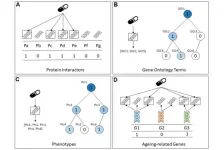(Press-News.org) All plants and lichens listed as endangered under the Endangered Species Act are sensitive to climate change but there are few plans in place to address this threat directly, according to a new study by Amy Casandra Wrobleski of Pennsylvania State University and colleagues, published July 26, 2023 in the open-access journal PLOS Climate.
Climate change is expected to have a major impact on species around the world, especially endangered species, which are already rare. A majority of the organisms listed under the Endangered Species Act are plants and lichen, and yet the risk that climate change poses to endangered plants has not been systematically evaluated in over a decade.
To address this gap, Wrobleski’s team adapted existing assessment tools used to examine the threat of climate change for wild animals and applied them to 771 listed plant species. Specifically, they evaluated how sensitive the listed plants and lichens were to climate change, if climate change was recognized as a threat for each species and if actions were underway to address the threat.
The researchers discovered that all listed plant and lichen species are at least slightly threatened by climate change. While a majority of the documentation for these species recognized climate change as a threat, there were few actions being taken to protect the listed species.
While acknowledging the threat that climate change poses to rare plants is an important first step, direct action must be taken to ensure the recovery of many of these species, the team concludes. As conditions continue to shift over the next century, clear and focused objectives will become even more vital for successful species recovery. They urge that their findings be used to aid in conservation planning for endangered plants and lichens, and to inform future recommendations for listing species and planning their recovery.
The authors add: “We evaluated the conservation plans for all endangered plant and lichen species listed in the Endangered Species Act and found that while climate change is recognized as a threat to the species, few conservation plans include actions to address climate change directly. Climate change will not only impact the lives of people, but also rare and endangered species and the ecosystems we interact with every day”.
#####
In your coverage please use this URL to provide access to the freely available article in PLOS Climate: https://journals.plos.org/climate/article?id=10.1371/journal.pclm.0000225
Citation: Wrobleski A, Ernst S, Weber T, Delach A (2023) The impact of climate change on endangered plants and lichen. PLOS Clim 2(7): e0000225. https://doi.org/10.1371/journal.pclm.0000225
Author Countries: US
Funding: The authors received no specific funding for this work.
END
Climate change threatens 771 endangered plant and lichen species
Despite the risk, very few of these species have recovery plans that directly address climate change
2023-07-26
ELSE PRESS RELEASES FROM THIS DATE:
Increased step count linked to better health for people with heart failure
2023-07-26
More often, people are turning to consumer wearable devices, such as smartwatches, to monitor their health and physical activity.
Using these wearable devices, a study led by Michigan Medicine and the University of Missouri with Saint Luke’s Mid America Heart Institute finds that taking more daily steps is associated improved health, including fewer symptoms and physical limitations, for people with heart failure. The results are published in JACC: Heart Failure.
Clinicians are increasingly presented with their patients’ wearable device data, ...
NIH spent $950M for basic or applied research leading to patents providing market exclusivity for drugs approved 2010-19
2023-07-26
BENTLEY UNIVERSITY
A new study from Bentley University’s Center for Integration of Science and Industry demonstrates that the National Institutes of Health (NIH) spent $950 million on basic or applied research associated with patents that provided manufacturers with market exclusivity. This amount represents <1% (0.59%) of the $164 billion in total NIH funding for research contributing to the approval of these products.
The article in PLOS ONE titled “NIH funding for patents that contribute ...
People with heart failure can step their way to better health
2023-07-26
People with heart failure who increase their daily step count also saw improvements in their health status over a 12-week period, according to a study published today in JACC: Heart Failure. The study suggests that physical data from wearable devices, such as step count, can be clinically significant and has the potential to inform future clinical trials and clinical care.
Consumer wearable devices to track health status and progress are commonly used and part of a growing trend of mobile health technology. However, how to interpret data from wearable devices, including step count, is at times ...
Ancient DNA reveals diverse community in “Lost City of the Incas”
2023-07-26
Who lived at Machu Picchu at its height? A new study, published today in Science Advances, used ancient DNA to find out for the first time where workers buried more than 500 years ago came from within the lost Inca Empire.
Researchers, including Jason Nesbitt, associate professor of archaeology at Tulane University School of Liberal Arts, performed genetic testing on individuals buried at Machu Picchu in order to learn more about the people who lived and worked there.
Machu Picchu is a UNESCO World Heritage Site located in the Cusco ...
Essential cell death-regulating mechanisms important for recovery from SARS-CoV infection and skin injury discovered
2023-07-26
Programmed cell death, a fundamental biological process that facilitates the elimination of old, damaged, infected, and non-functional cells, plays a crucial role in maintaining the balance between health and disease in the human body. Research by the team of Dr Alessandro Annibaldi from the Center for Molecular Medicine Cologne (CMMC) at the University of Cologne has uncovered a novel mechanism of cell death regulation, shedding light on its significance during conditions such as SARS-CoV infection and skin injury. The study ‘Cleavage ...
DNA analysis offers new insights into diverse community at Machu Picchu
2023-07-26
New Haven, Conn. — A genetic analysis suggests that the servants and retainers who lived, worked, and died at Machu Picchu, the renowned 15th century Inca palace in southern Peru, were a diverse community representing many different ethnic groups from across the Inca empire.
The genomic data, described in a new study in Science Advances, is the first investigation of the genomic diversity of individuals buried at Machu Picchu and adjacent places around Cusco, the Inca capital. It builds upon previous archeological and bio-archaeological research, including a 2021 Yale-led study which found that Machu Picchu (AD 1420-1530) is older than was previously believed.
“The ...
Lost metabolic fitness of CAR NK cells is key mechanism of tumor resistance
2023-07-26
A new study led by researchers at The University of Texas MD Anderson Cancer Center discovered loss of metabolic fitness in chimeric antigen receptor (CAR) natural killer (NK) cells is a critical mechanism of resistance, with infused cells gradually losing the ability to compete with tumor cells for nutrients, leading to tumor relapse.
The study, published today in Science Advances, demonstrates that engineering CAR NK cells to express interleukin-15 (IL-15) enhances the cells’ metabolic fitness and provides a longer-lasting ...
Researchers develop machine learning models that could improve suicide-risk prediction among children
2023-07-26
A new study from UCLA Health researchers finds that the typical ways health systems store and track data on children receiving emergency care miss a sizable portion of those who are having self-injurious thoughts or behaviors. The researchers also found that several machine learning models they designed were significantly better at identifying those children at risk of self-harm.
Amid a nationwide youth mental health crisis, mental health providers are trying to improve their understanding of which children are at-risk of suicide or self-harm so providers can intervene earlier. However, health systems often ...
DOE announces $33 million to advance energy research across America
2023-07-26
WASHINGTON, D.C. — The U.S. Department of Energy (DOE) today announced $33 million to support 14 clean-energy research projects as part of a program to ensure the Department’s research funding is reaching pockets of the country that traditionally have received disproportionally low amounts of Federal scientific funding. The projects will cover a range of topics—including grid integration, renewable solar and wind energy, and advanced manufacturing. Today’s funding will help ensure all regions of the country share in the ownership of priority research that advances science and addresses energy ...
Predicting lifespan-extending chemical compounds for C. elegans with machine learning
2023-07-26
“We created datasets for predicting whether or not a compound extends the lifespan of C. elegans [...]”
BUFFALO, NY- July 26, 2023 – A new research paper was published in Aging (listed by MEDLINE/PubMed as "Aging (Albany NY)" and "Aging-US" by Web of Science) Volume 15, Issue 13, entitled, “Predicting lifespan-extending chemical compounds for C. elegans with machine learning and biologically interpretable features.”
Recently, there has been a growing interest in the development of pharmacological interventions targeting ...
LAST 30 PRESS RELEASES:
Hairdressers could be a secret weapon in tackling climate change, new research finds
Genetic risk for mental illness is far less disorder-specific than clinicians have assumed, massive Swedish study reveals
A therapeutic target that would curb the spread of coronaviruses has been identified
Modern twist on wildfire management methods found also to have a bonus feature that protects water supplies
AI enables defect-aware prediction of metal 3D-printed part quality
Miniscule fossil discovery reveals fresh clues into the evolution of the earliest-known relative of all primates
World Water Day 2026: Applied Microbiology International to hold Gender Equality and Water webinar
The unprecedented transformation in energy: The Third Energy Revolution toward carbon neutrality
Building on the far side: AI analysis suggests sturdier foundation for future lunar bases
Far-field superresolution imaging via k-space superoscillation
10 Years, 70% shift: Wastewater upgrades quietly transform river microbiomes
Why does chronic back pain make everyday sounds feel harsher? Brain imaging study points to a treatable cause
Video messaging effectiveness depends on quality of streaming experience, research shows
Introducing the “bloom” cycle, or why plants are not stupid
The Lancet Oncology: Breast cancer remains the most common cancer among women worldwide, with annual cases expected to reach over 3.5 million by 2050
Improve education and transitional support for autistic people to prevent death by suicide, say experts
GLP-1 drugs like Ozempic could cut risk of major heart complications after heart attack, study finds
Study finds Earth may have twice as many vertebrate species as previously thought
NYU Langone orthopedic surgeons present latest clinical findings and research at AAOS 2026
New journal highlights how artificial intelligence can help solve global environmental crises
Study identifies three diverging global AI pathways shaping the future of technology and governance
Machine learning advances non targeted detection of environmental pollutants
ACP advises all adults 75 or older get a protein subunit RSV vaccine
New study finds earliest evidence of big land predators hunting plant-eaters
Newer groundwater associated with higher risk of Parkinson’s disease
New study identifies growth hormone receptor as possible target to improve lung cancer treatment
Routine helps children adjust to school, but harsh parenting may undo benefits
IEEE honors Pitt’s Fang Peng with medal in power engineering
SwRI and the NPSS Consortium release new version of NPSS® software with improved functionality
Study identifies molecular cause of taste loss after COVID
[Press-News.org] Climate change threatens 771 endangered plant and lichen speciesDespite the risk, very few of these species have recovery plans that directly address climate change

